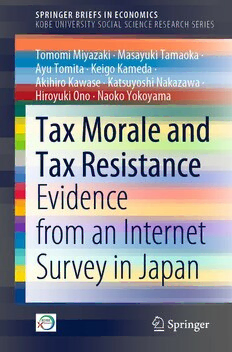
Tax Morale and Tax Resistance: Evidence from an Internet Survey in Japan PDF
Preview Tax Morale and Tax Resistance: Evidence from an Internet Survey in Japan
SPRINGER BRIEFS IN ECONOMICS KOBE UNIVERSITY SOCIAL SCIENCE RESEARCH SERIES Tomomi Miyazaki · Masayuki Tamaoka · Ayu Tomita · Keigo Kameda · Akihiro Kawase · Katsuyoshi Nakazawa · Hiroyuki Ono · Naoko Yokoyama Tax Morale and Tax Resistance Evidence from an Internet Survey in Japan SpringerBriefs in Economics Kobe University Social Science Research Series SeriesEditors YunfangHu,KobeUniversityGraduateSchoolofEconomics,Kobe,Japan ShigeyukiHamori,KobeUniversityGraduateSchoolofEconomics,Kobe,Japan EditorialBoard MasahiroEnomoto,KobeUniversityRIEB,Kobe,Japan YoshihideFujioka,KobeUniversityGraduateSchoolofEconomics,Kobe,Japan YukaKaneko,KobeUniversityCenterforSocialSystemsInnovation,Kobe, Hyogo,Japan KazumiSuzuki,KobeUniversityGraduateSchoolofBusinessAdministration, Kobe,Japan KenjiYamamoto,KobeUniversityGraduateSchoolofLaw,Kobe,Japan The Kobe University Social Science Research Series has been established as a subseriesoftheSpringerBriefinEconomicsSeries,butinfactthisexcitinginterdis- ciplinarycollectionencompassesscholarlyresearchnotonlyintheeconomics but also in law, political science, business and management, accounting, international relations,andothersubdisciplineswithinthesocialsciences.Asanationaluniver- sitywithaspecialstrengthinthesocialsciences,KobeUniversityactivelypromotes interdisciplinaryresearch.Thisseriesisnotlimitedonlytoresearchemergingfrom KobeUniversity’sfacultiesofsocialsciencesbutalsowelcomescross-disciplinary researchthatintegratesstudiesintheartsandsciences. Kobe University, founded in 1902, is the second oldest national higher educa- tioninstitutionforcommerceinJapanandisnowapreeminentinstitutionforsocial scienceresearchandeducationinthecountry.Currently,thesocialsciencessection includes four faculties — Law, Economics, Business Administration, and Interna- tionalCooperationStudies—andtheResearchInstituteforEconomicsandBusiness Administration (RIEB). There are some 230-plus researchers who belong to these facultiesandconductjointresearchthroughtheCenterforSocialSystemsInnovation andtheOrganizationforAdvancedandIntegratedResearch,KobeUniversity.This bookseriescomprisesacademicworksbyresearchersinthesocialsciencesatKobe University as well as their collaborators at affiliated institutions, Kobe University alumniandtheircolleagues,andrenownedscholarsfromaroundtheworldwhohave workedwithacademicstaffatKobeUniversity.Althoughtraditionallytheresearch of Japanese scholars has been publicized mainly in the Japanese language, Kobe UniversitystrivestopromotepublicationanddisseminationofworksinEnglishin ordertofurthercontributetotheglobalacademiccommunity. Moreinformationaboutthissubseriesathttps://link.springer.com/bookseries/15423 · · Tomomi Miyazaki Masayuki Tamaoka · · · Ayu Tomita Keigo Kameda Akihiro Kawase · · Katsuyoshi Nakazawa Hiroyuki Ono Naoko Yokoyama Tax Morale and Tax Resistance Evidence from an Internet Survey in Japan TomomiMiyazaki MasayukiTamaoka GraduateSchoolofEconomics GraduateSchoolofEconomics KobeUniversity KobeUniversity Kobe,Hyogo,Japan Kobe,Hyogo,Japan AyuTomita KeigoKameda GraduateSchoolofEconomics SchoolofPolicyStudies KobeUniversity KwanseiGakuinUniversity Kobe,Hyogo,Japan Sanda,Hyogo,Japan AkihiroKawase KatsuyoshiNakazawa FacultyofEconomics FacultyofEconomics ToyoUniversity ToyoUniversity Bunkyo-ku,Tokyo,Japan Bunkyo-ku,Tokyo,Japan HiroyukiOno NaokoYokoyama FacultyofEconomics FacultyofEconomics ToyoUniversity OsakaSangyoUniversity Bunkyo-ku,Tokyo,Japan Daito,Osaka,Japan ISSN2191-5504 ISSN2191-5512 (electronic) SpringerBriefsinEconomics ISSN2520-1697 ISSN2520-1700 (electronic) KobeUniversitySocialScienceResearchSeries ISBN978-981-19-0477-6 ISBN978-981-19-0478-3 (eBook) https://doi.org/10.1007/978-981-19-0478-3 ©TheAuthor(s),underexclusivelicensetoSpringerNatureSingaporePteLtd.2022 Thisworkissubjecttocopyright.AllrightsaresolelyandexclusivelylicensedbythePublisher,whether thewholeorpartofthematerialisconcerned,specificallytherightsoftranslation,reprinting,reuse ofillustrations,recitation,broadcasting,reproductiononmicrofilmsorinanyotherphysicalway,and transmissionorinformationstorageandretrieval,electronicadaptation,computersoftware,orbysimilar ordissimilarmethodologynowknownorhereafterdeveloped. Theuseofgeneraldescriptivenames,registerednames,trademarks,servicemarks,etc.inthispublication doesnotimply,evenintheabsenceofaspecificstatement,thatsuchnamesareexemptfromtherelevant protectivelawsandregulationsandthereforefreeforgeneraluse. Thepublisher,theauthorsandtheeditorsaresafetoassumethattheadviceandinformationinthisbook arebelievedtobetrueandaccurateatthedateofpublication.Neitherthepublishernortheauthorsor theeditorsgiveawarranty,expressedorimplied,withrespecttothematerialcontainedhereinorforany errorsoromissionsthatmayhavebeenmade.Thepublisherremainsneutralwithregardtojurisdictional claimsinpublishedmapsandinstitutionalaffiliations. ThisSpringerimprintispublishedbytheregisteredcompanySpringerNatureSingaporePteLtd. The registered company address is: 152 Beach Road, #21-01/04 Gateway East, Singapore 189721, Singapore Preface TaxpayersinJapanareoftendescribedasbeingveryresistanttotaxincreases,espe- cially consumption tax increases. Indeed, the former Prime Minister, Masayoshi Ohira, who first mentioned the necessity for taxes on a broad range of consump- tiongoods,lostthesnapgeneralelection.Meanwhile,thecabinetofformerprime minister, Sosuke Uno, lost the Upper House election right after introducing the consumptiontax—thiswasthefirsttimethatoppositionpartieswonthemajorityof theUpperHousesincethefoundationoftheLiberalDemocraticParty.Thesefacts indicatethattaxresistance(i.e.,asperSchmölders’s[1965]definition,psychological resistancetotaxpayment)maybestronginJapan. Although many studies on consumption tax have been done in Japan, attention hasrecentlymovedtothetopicssuchasconsumerpsychology,taxconsciousness, tax morale, etc. For example, when it comes to consumer psychology, Ishida and Nakazono(2020)examinedthe“salienteffects”ofChettyetal.(2009)byfocusing on the total amount display system, which requires prices to include consumption tax.Regardingtaxmorale,theWorldValueSurvey(WVS),afamousattitudeques- tionnaireconductedaroundtheglobe,reportsthatJapanesecitizensdemonstratea hightaxmorale. The previous information suggests that while taxpayers in Japan resist tax increases,theirnon-pecuniarymotivationfortaxcomplianceishigh.Althoughthese are established facts about taxpayers in Japan, to the best of our knowledge, few attitudequestionnairesforJapanesecitizenssimultaneouslyfocusontaxhikesand tax compliance. Therefore, as parts of a project supported by a Grant-in-Aid for ScientificResearch,weconductedtwosurveysin2019and2020toexaminethetwo aforementionedestablishedfactsandrelatedtopicsamongtaxpayersinJapan. Thisbookprovidesbackgroundinformationandbasicdescriptivestatisticsfrom our Internet surveys in Japan. The first survey was implemented in August 2019. Weconductedafollow-upsurveyin2020tocheckforchangesinopinionafterthe consumptiontaxhikeinOctober2019.Thesetwosurveysaddressimportanttopics on tax and fiscal policies, such as tax morale and tax compliance, opinions on the JapaneseconsumptiontaxhikeinOctober2019andtheeffectsofdebtaccumulation onconsumption. v vi Preface We strived to address some of the problems inherent to the Internet survey. The first concern regards representativeness. We confirmed the representativeness of residential areas and household structure using the National Census. Moreover, allrespondentswererandomlychosen. Inthisbook,wefocusontaxmoraleandtheconsumptiontaxhike.Thesummary statisticsindicatethattaxmoraleishighinJapan,whichisconsistentwiththeWVS. However,halfofthefirstsurveyrespondentsopposedtheconsumptiontaxhikefrom 8%to10%.Further,about60%ofrespondentsstatedthattheir“ideal”consumption taxrateislessthan10%.Weconfirmedthisinthesecondsurvey,whichdidnotgive somerespondentsinformationonthesizeofgovernmentdebtoutstanding. The correlation matrix for the relevant questions reveals an insignificant rela- tionship between tax morale and the indicators regarding trust in politicians and government. What is more, we found a slightly positive relationship between tax moraleandsocialnormsorasenseofsin.Thus,thesourceofthehightaxmoraleof theJapanesepeoplecanpartlybeexplainedbytheirmotivationtoabidebyrulesor socialnorms. Regardingtaxresistance,wefoundaslightlynegativerelationshipbetweenresis- tancetotheconsumptiontaxhikeandtrustingovernment.Thisimpliesthatpolitical distrustmaycultivateresistancetofurthertaxhikes. We realize the necessity for further econometric exercises. As an overture to further studies, this book introduces all our questionnaires and provides a brief outlookforthesurvey. Kobe,Japan TomomiMiyazaki Kobe,Japan MasayukiTamaoka Kobe,Japan AyuTomita Sanda,Japan KeigoKameda Bunkyo-ku,Japan AkihiroKawase Bunkyo-ku,Japan KatsuyoshiNakazawa Bunkyo-ku,Japan HiroyukiOno Daito,Japan NaokoYokoyama Acknowledgments Someanalysesinthisbookarebasedon“ConsumptionTaxHike,TaxMorale, andTaxResistance:TaxpayerParadoxinJapan,”publishedinthePublicChoiceStudiesNo.73. Theauthorsaregratefultoananonymousreferee,NobuoAkai,YoshihideFujioka,JunyaHamaaki, MasayoshiHayashi,BerndHayo,TakayukiNago,HaruoKondoh,KazuakiSato,MasaakiSuzuki, Takashi Shimuzu, Kentaro Tachi, Toshiyuki Uemura and Kazufumi Yugami for their insightful comments and suggestions. This work was financially supported by the Japan Society for the Promotion of Science (Grant-in-Aid for Scientific Research #16H03637 and #18H00868). The usualdisclaimerapplies. Preface vii References ChettyR,LooneyA,KroftK(2009)Salienceandtaxation:theoryandevidence.AmEconRev 99(4):1145–1177 IshidaS,NakazonoY(2020)Thesalienteffect:evidencefromtheconsumptiontaxhikeinJapan. ApaperpresentedattheJapaneseEconomicAssociation2020SpringMeeting SchmöldersG(1965)Finanzpolitik,ZwiteAuflage,Springer-Verlag Contents 1 Introduction .................................................... 1 2 ABriefLookatJapan’sOctober2019ConsumptionTaxHike ....... 3 2.1 OverviewofJapan’sConsumptionTaxSystem .................. 3 2.2 BackgroundoftheConsumptionTaxHike ...................... 4 References ...................................................... 7 3 SurveyDesign ................................................... 9 3.1 The Attitude of the Japanese People Toward Tax Policy andSurveyDesign ........................................... 9 3.2 OutlineoftheFirstSurvey .................................... 10 3.3 OutlineoftheSecondSurvey ................................. 11 3.4 LimitingRespondentsandCheckingRepresentativeness .......... 12 Appendix ....................................................... 17 References ...................................................... 17 4 SummaryStatistics .............................................. 19 4.1 TaxMoraleandTaxCompliance ............................... 19 4.2 TaxResistance .............................................. 24 4.3 ObservationfromtheCorrelationMatrix ........................ 28 References ...................................................... 29 5 Conclusion ..................................................... 31 Reference ....................................................... 32 AppendixA:EachItemoftheFirstSurvey ........................... 33 AppendixB:EachItemoftheSecondSurvey ......................... 43 ix Chapter 1 Introduction Thisbookprovidesbackgroundinformationandbasicdescriptivestatisticsfromour InternetsurveysinJapan.ThesurveyswereimplementedinAugust2019andJuly 2020aspartsofaprojectsupportedbyaGrant-in-AidforScientificResearch.These twosurveysaddressimportanttopicsontaxandfiscalpolicies,suchastaxmorale andtaxcompliance,opinionsontheJapaneseconsumptiontaxhikeinOctober2019, andtheeffectsofdebtaccumulationonconsumption,etc. Thisstudyreportsresultsrelatedtotaxmoraleandopinionsontheconsumption taxhike.ThesummarystatisticsindicatethatwhiletaxmoraleishighinJapan,half oftherespondentsopposetheconsumptiontaxhikefrom8to10%.Furthermore,the “ideal”consumptiontaxrateformostwaslessthan10%inbothsurveys,suggesting thatJapanesetaxpayersareveryresistanttotaxpayment.Althoughthecorrelation between some answers is weak, the source of tax resistance can be attributed to distrustofpoliticiansandthecentralgovernment. Theremainderofthispaperisorganizedasfollows.Chapter2providestheback- ground information on the Japanese consumption tax hike in October 2019 and relatedpolicies.Chapter3presentsthesurveydesign.Chapter4reportspartsofthe summarystatisticsontaxmorale,taxcompliance,andattitudetowardconsumption taxhikes.Chapter5concludesthestudy. ©TheAuthor(s),underexclusivelicensetoSpringerNatureSingaporePteLtd.2022 1 T.Miyazakietal.,TaxMoraleandTaxResistance,KobeUniversitySocialScience ResearchSeries,https://doi.org/10.1007/978-981-19-0478-3_1
